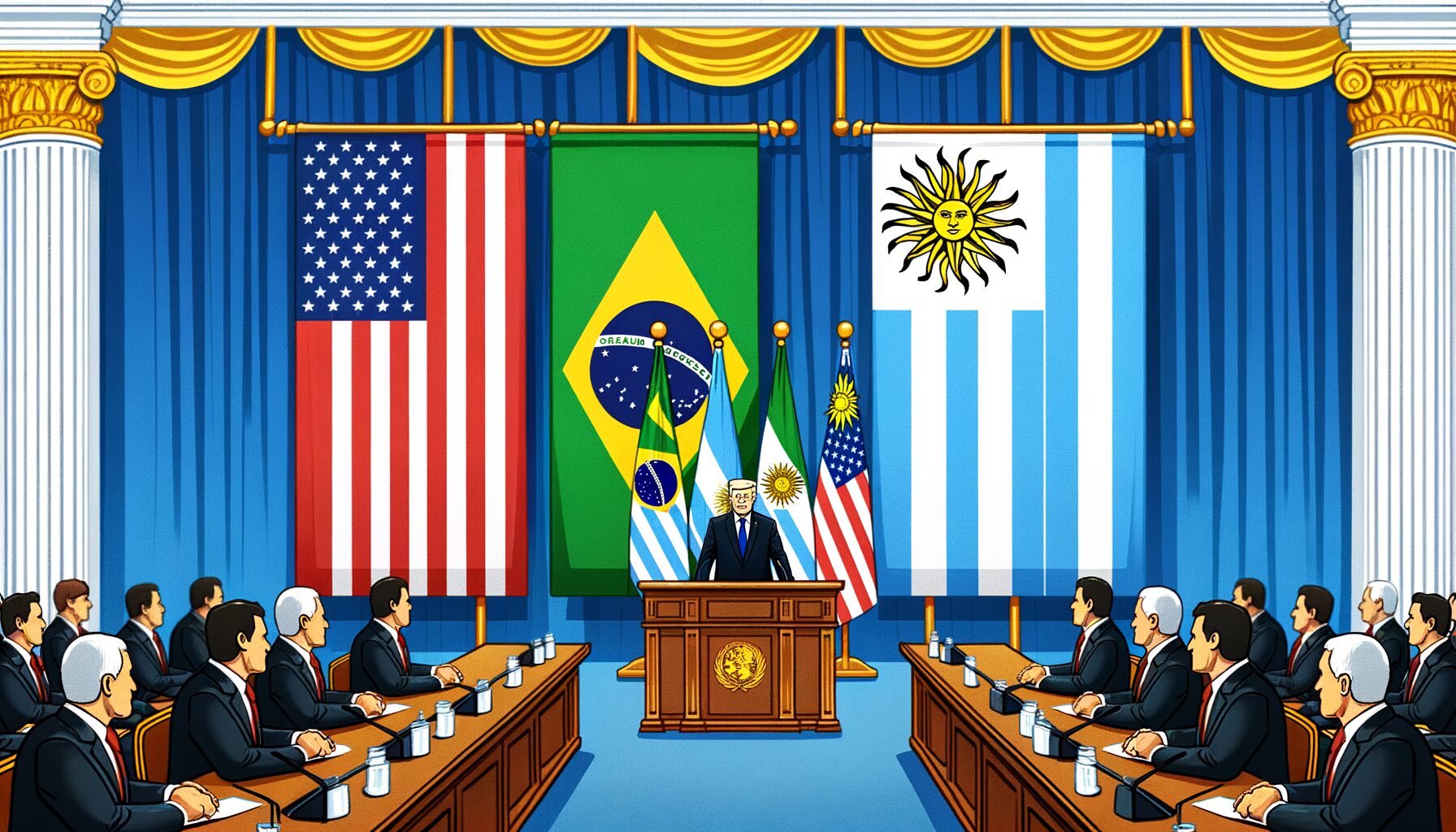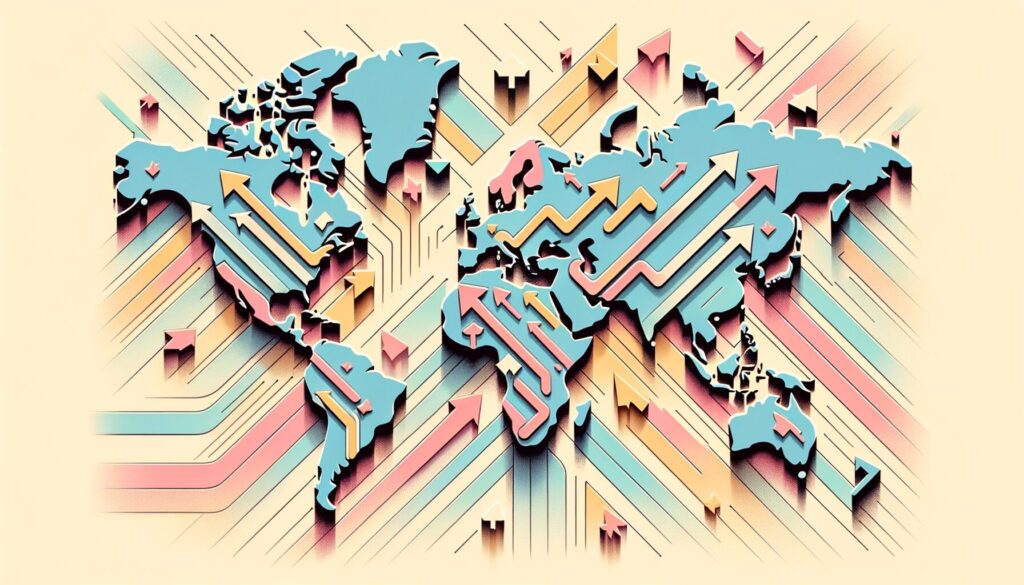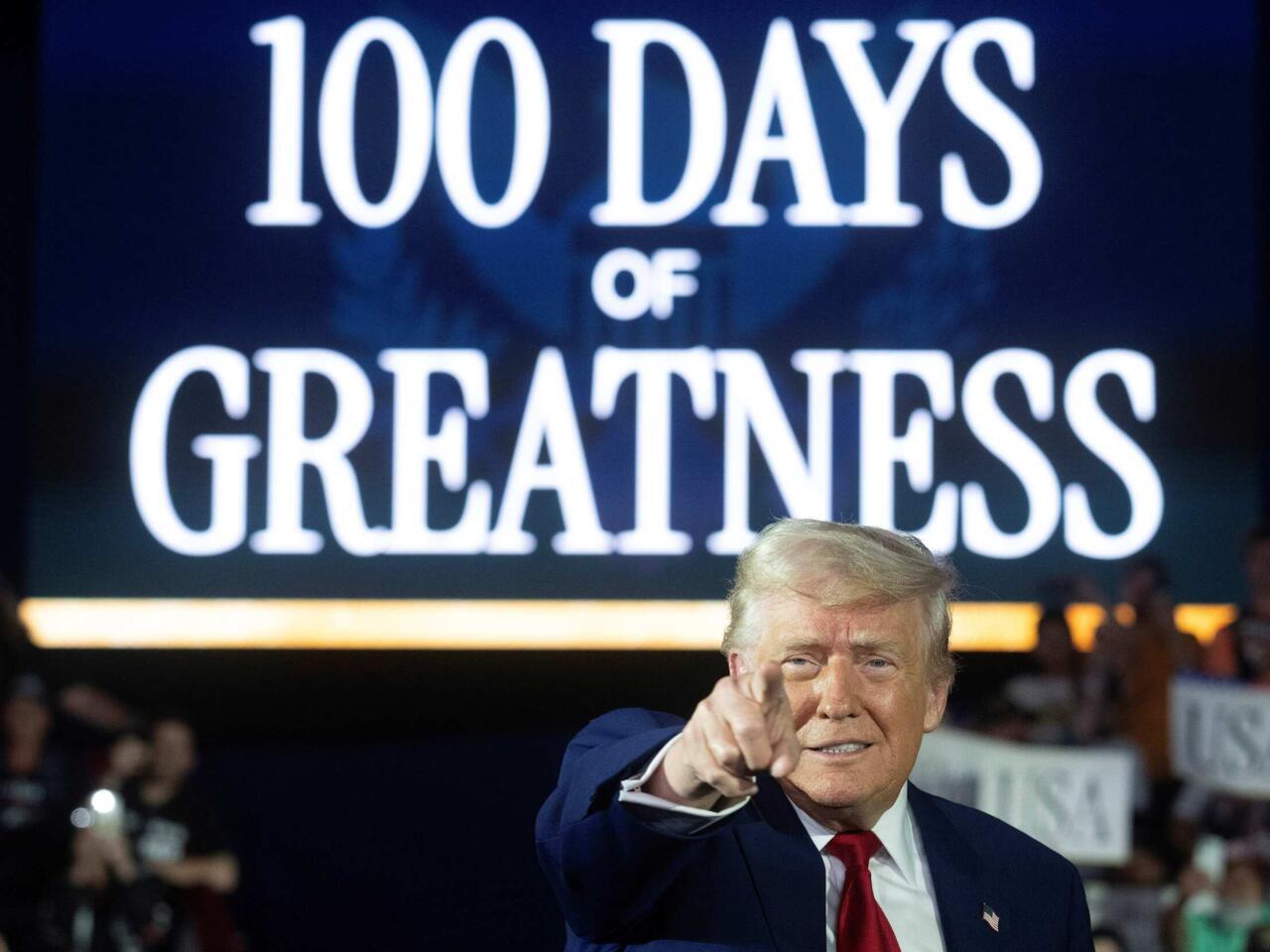Trump’s Tariff Shock: How Brazil, Argentina & Uruguay May Cash In

Trump’s tariff policies affecting South America – Brazil, Argentina, and Uruguay have created some really interesting opportunities for these economies. With China currently facing a whopping tariff hit and South American nations receiving only about 10%, there’s actually a significant trade advantage that has emerged. This stark contrast in Trump tariff rates might allow Brazil, Argentina, and Uruguay to capture and also expand their market share in both U.S. and Chinese markets as global supply chains continue to adjust and evolve.
Also Read: Shiba Inu or XRP: Where Should You Bet for Profits In May 2025?
Could US-China Trade Tensions Boost South America’s Exports?

Trump’s tariff impact on global trade could, right now, significantly benefit Brazil, Argentina, and Uruguay as they are positioning themselves to fill in the gaps in international supply chains. With most South American countries receiving relatively modest 10% tariffs compared to China’s massive ones, new and promising export opportunities are definitely emerging in several key sectors.
Brazil’s Agricultural Opportunity
Brazil’s agricultural sector stands to gain the most from current Trump tariff policies, particularly in soybean exports to China. Previous trade tensions between the US and China have already demonstrated this pattern in recent years.
Frederico D’Avila, a farmer and former politician associated with Brazil’s soybean producers’ group Aprosoja, stated:
“Trump’s first term was excellent for Brazilian agriculture. Trump’s tariffs in that time favoured us.”
Brazil’s position as the world’s largest coffee producer could also strengthen if the higher tariffs on Vietnamese and Indonesian coffee are reinstated in July, an event many analysts are currently watching closely.
Also Read: Goldman Sachs: Hedge Funds Make Shocking Bank Stock Move
Argentina’s Complex Position
Trump’s tariff policies create an ambiguous future perspective for Argentina. Agricultural exports should see growth in future months yet industrial export sectors namely steel and aluminum sectors are affected by 25% metal tariffs.
Carlos Vaccaro, executive director of the Argentine Steel Chamber, expressed concern:
“We’re worried by the diversion of what can no longer enter the US.”
Uruguay’s Mercosur Leverage
Uruguay sees Trump’s tariff policies as potential leverage in their ongoing Mercosur-EU negotiations. The situation may actually accelerate trade deals as Europe looks for more reliable trading partners in an increasingly uncertain global environment.
Uruguay’s President Yamandú Orsi noted:
“Europe has little choice now but to lower its demands somewhat.”
Cautionary Economic Outlook
Some economists warn that volatility risks exist in spite of the new opportunities these policies give to Brazil along with Argentina and Uruguay. The prices of global commodities easily succumb to market variations alongside trade tensions.
Eduardo Levy Yeyati, a former chief economist at Argentina’s Central Bank, cautioned:
“If Brazil fills in the US quota of goods exports to China, the US may choose to punish Brazil.”
Also Read: Cryptocurrency: Pepe (PEPE) Vs Dogecoin (DOGE): AI’s 2025 Profit Prediction
Juan Carlos Hallak, professor of international economics at the University of Buenos Aires, added perspective on the potential benefits:
“The prices are [instead] affected by macroeconomic factors… for example if there is a recession.”
The policy shifts from Trump regarding tariffs force South American countries to exercise strategic caution when assessing their international trade relations. Brazil along with Argentina and Uruguay currently have better trade tariffs regarding China but they face a high vulnerability to rapid changes in this unstable international trade framework.
Trump’s Tariff Shock: How Brazil, Argentina & Uruguay May Cash In

Trump’s tariff policies affecting South America – Brazil, Argentina, and Uruguay have created some really interesting opportunities for these economies. With China currently facing a whopping tariff hit and South American nations receiving only about 10%, there’s actually a significant trade advantage that has emerged. This stark contrast in Trump tariff rates might allow Brazil, Argentina, and Uruguay to capture and also expand their market share in both U.S. and Chinese markets as global supply chains continue to adjust and evolve.
Also Read: Shiba Inu or XRP: Where Should You Bet for Profits In May 2025?
Could US-China Trade Tensions Boost South America’s Exports?

Trump’s tariff impact on global trade could, right now, significantly benefit Brazil, Argentina, and Uruguay as they are positioning themselves to fill in the gaps in international supply chains. With most South American countries receiving relatively modest 10% tariffs compared to China’s massive ones, new and promising export opportunities are definitely emerging in several key sectors.
Brazil’s Agricultural Opportunity
Brazil’s agricultural sector stands to gain the most from current Trump tariff policies, particularly in soybean exports to China. Previous trade tensions between the US and China have already demonstrated this pattern in recent years.
Frederico D’Avila, a farmer and former politician associated with Brazil’s soybean producers’ group Aprosoja, stated:
“Trump’s first term was excellent for Brazilian agriculture. Trump’s tariffs in that time favoured us.”
Brazil’s position as the world’s largest coffee producer could also strengthen if the higher tariffs on Vietnamese and Indonesian coffee are reinstated in July, an event many analysts are currently watching closely.
Also Read: Goldman Sachs: Hedge Funds Make Shocking Bank Stock Move
Argentina’s Complex Position
Trump’s tariff policies create an ambiguous future perspective for Argentina. Agricultural exports should see growth in future months yet industrial export sectors namely steel and aluminum sectors are affected by 25% metal tariffs.
Carlos Vaccaro, executive director of the Argentine Steel Chamber, expressed concern:
“We’re worried by the diversion of what can no longer enter the US.”
Uruguay’s Mercosur Leverage
Uruguay sees Trump’s tariff policies as potential leverage in their ongoing Mercosur-EU negotiations. The situation may actually accelerate trade deals as Europe looks for more reliable trading partners in an increasingly uncertain global environment.
Uruguay’s President Yamandú Orsi noted:
“Europe has little choice now but to lower its demands somewhat.”
Cautionary Economic Outlook
Some economists warn that volatility risks exist in spite of the new opportunities these policies give to Brazil along with Argentina and Uruguay. The prices of global commodities easily succumb to market variations alongside trade tensions.
Eduardo Levy Yeyati, a former chief economist at Argentina’s Central Bank, cautioned:
“If Brazil fills in the US quota of goods exports to China, the US may choose to punish Brazil.”
Also Read: Cryptocurrency: Pepe (PEPE) Vs Dogecoin (DOGE): AI’s 2025 Profit Prediction
Juan Carlos Hallak, professor of international economics at the University of Buenos Aires, added perspective on the potential benefits:
“The prices are [instead] affected by macroeconomic factors… for example if there is a recession.”
The policy shifts from Trump regarding tariffs force South American countries to exercise strategic caution when assessing their international trade relations. Brazil along with Argentina and Uruguay currently have better trade tariffs regarding China but they face a high vulnerability to rapid changes in this unstable international trade framework.

